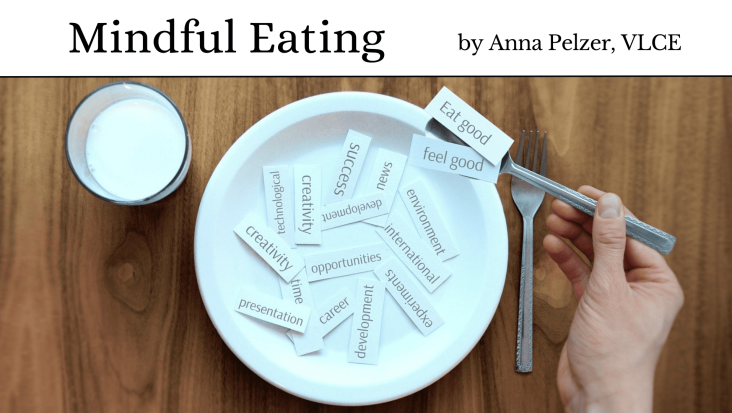posted April 16, 2024

Mindful eating helps you learn how to eat according to your own needs.
Eating when stressed can lead to overeating. Feeling bored or empty, such as while working at a job you don’t like, often promotes reaching for food to provide comfort or stimulation. Overeating leads to many health problems.
Being in a state of relaxation while you eat calms the gastrointestinal tract and can help prevent bloating, gas, and indigestion.
Menopause Weight Gain
As estrogen drops in menopausal women, there is a tendency toward eating more and moving less, leading to weight gain. They can also become resistant to leptin, a hormone that signals satiety, and may not recognize when they are full.
How Mindful Eating Can Help

Mindful eating can help you become more aware of your hunger and how satisfied you are. You may have spent years overeating or dieting, or switching back and forth—yo-yo dieting. Or you may have eaten most of your meals according to other people’s schedules or eaten quickly, such as before meetings or in the car between errands. Habits such as these can cause us to forget how to recognize true hunger or satiation.
If you are truly hungry, you might feel your stomach growling or feeling empty. You also might be more willing to eat food in general, as opposed to a specific food. Ask yourself—would I eat beans and veggies right now or am I just hungry for chocolate? Is my hunger coming from my body or my thoughts?
If you recognize that it’s not actual hunger, maybe there’s something else you need other than food right now for distraction or comfort. Call a friend, go for a walk, put on a song you like, smell an essential oil you enjoy.
Remember that sometimes when we are craving food, we could just be thirsty, so try drinking a glass of water and see how that feels.
If you recognize that there is an emotional reason you want to eat, you could take a moment to journal what’s going on. And then you can consciously choose whether you still want to give into the craving, but do it in a mindful way, with awareness and respect.
Savoring and mindfully enjoying your food can help you eat less but feel more satisfied.
What a Mindful Eating Practice Could Look Like

First, set up your eating environment to make it more pleasurable. This could just be a clean table, but you can also add some lovely extra touches with fresh flowers, candles, or music. The important thing is that there are no distractions such as a TV or electronics, because the news and social media can be stressful, even at a low level.
Before your first bite, take some time to enjoy the smell and the visual appeal of the food. Acknowledge and appreciate where your food came from. Where and how it was grown, all the water and sunlight the plants took in. You could find a way to say thank you. Take a few breaths and mentally prepare to receive the food. And with each bite, notice the texture, and flavors. Chew your food well, until it is of an even consistency. Pause in between bites. Put your fork down and breathe or a sip of water. After every few bites, notice how your body feels and whether you have had enough food to satisfy your body’s needs.
When you are finished eating, take a moment to relax and digest your food.
I recognize that this might not be realistic for you to do at every meal, and you might also be influenced by other people in your home, but you could include just one element. Perhaps start with one meal a day or one day a week, or even slow down a few bites at the start of each meal. This would be a great starting point and you could build from there. If you regularly eat while you are in front of the computer, you could start with one meal per week without electronics.
Following some or all of these tips are definitely beneficial, and again, don’t feel the need to be perfect about it, it’s not all or nothing. Any step you take will add up to big results over time.

Anna Pelzer is a Main Street Vegan Academy Vegan Lifestyle Coach and Educator, menopause coach, and meditation instructor. She uses vegan nutrition, stress reduction, body awareness, and lifestyle practices to help women have a better experience through their transition to menopause. She is also the host of the Vegan Menopause Podcast.
Find Anna on her website, Blissful Menopause, Instagram @anna.pelzer, and YouTube.

